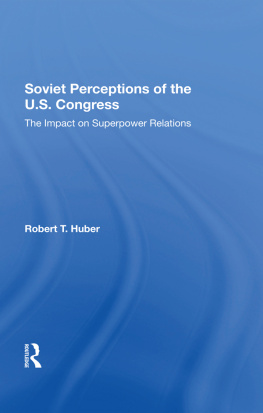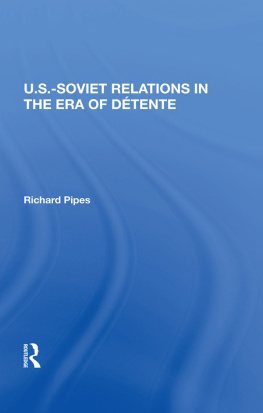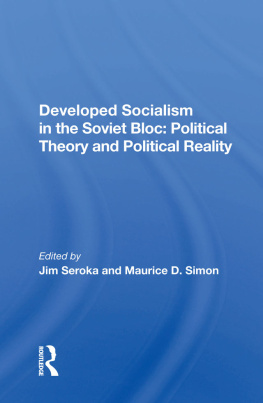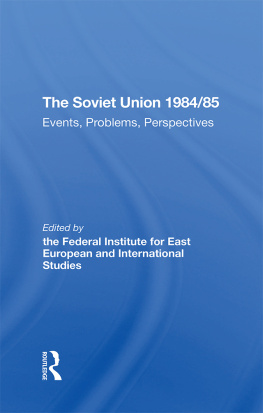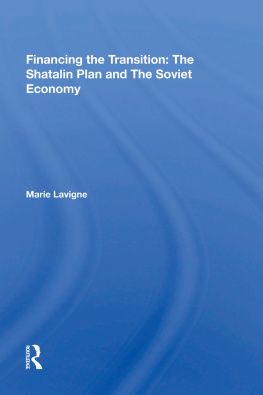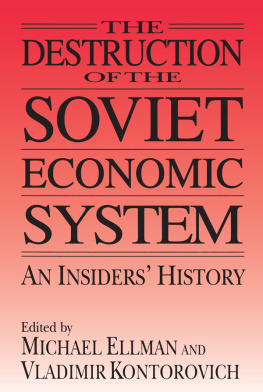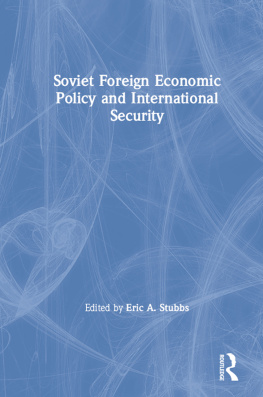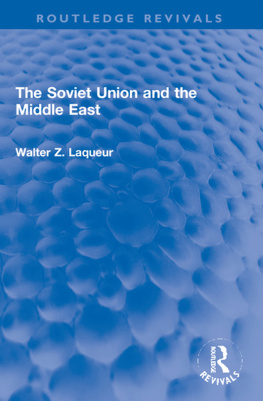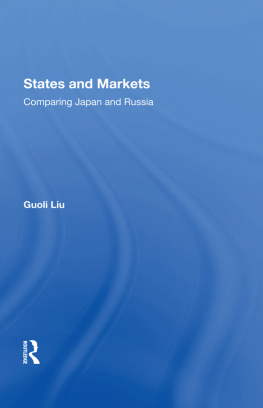The Soviet Union in Transition
About the Book and Editor
Because of the recent transition in the Soviet Union's leadership, scholars worldwide have found it necessary to reevaluate Soviet domestic and foreign policy. In this volume, prominent Japanese, U.S., and European experts examine changes within the USSR as well as Soviet reactions to changes in the rest of the world. They assess the immediate implications of change for such areas as technology, energy policy, and economic reform and deliver commentaries on current policy directions and historical backgrounds of Soviet policies.
To commemorate its silver jubilee and to add the valuable perspective of Japanese Soviet-studies scholars to Western analyses, the Japan Institute of International Affairs held the symposium on which this volume is based.
Kinya Niiseki is director of the Japan Institute of International Affairs and the former Japanese ambassador to Austria, India, and the USSR.
Published in cooperation with the Japan Institute of International Affairs
The Japan Institute of International Affairs, a central research institution, was founded in 1959 on the strong initiative of the late Prime Minister Shigeru Yoshida. In 1960 it was formally authorized by the Japanese Ministry of Foreign Affairs as a private, nonprofit, and independent organization. In commemoration of its twenty-fifth anniversary in 1985, the institute created the nation's first Center for Soviet Studies, aiming at enlarging and strengthening the study of the Soviet Union. At present, the institute's sphere of research covers a broad spectrum of issues ranging from international politics to international economics and law, thereby reflecting the enhanced position of Japan in the world community.
The Soviet Union in Transition
edited by Kinya Niiseki
Contributors
Seweryn Bialer
Sir James Eberle
Marshall I. Goldman
Tsuyoshi Hasegawa
Kenichi Ito
Young C. Kim
Hiroshi Kimura
Kazuyuki Kinbara
Peter Knirsch
Boris Meissner
Tsuneaki Sato
Donald S. Zagoria
First published 1987 by Westview Press
Published 2019 by Routledge
52 Vanderbilt Avenue, New York, NY 10017
2 Park Square, Milton Park, Abingdon, Oxon OX14 4RN
Routledge is an imprint of the Taylor & Francis Group, an informa business
Copyright 1987 by Taylor & Francis
All rights reserved. No part of this book may be reprinted or reproduced or utilised in any form or by any electronic, mechanical, or other means, now known or hereafter invented, including photocopying and recording, or in any information storage or retrieval system, without permission in writing from the publishers.
Notice:
Product or corporate names may be trademarks or registered trademarks, and are used only for identification and explanation without intent to infringe.
Library of Congress Cataloging-in-Publication Data
The Soviet Union in transition.
(Westview special studies on the Soviet Union
and Eastern Europe)
1. Soviet UnionForeign relations1975-
2. Soviet UnionEconomic policy1981-
3. Soviet UnionPolitics and government1953-
4. Soviet UnionForeign relationsAsia. 5. Asia
Foreign relationsSoviet Union. I. Niiseki, Kinya,
1916- . II. Series.
DK289.S686 1987 327.47 86-32611
British Library Cataloguing-in-Publication Data
The Soviet Union in transition.(West-
view special studies on the Soviet Union
and Eastern Europe).
1. Soviet UnionForeign relations
1975-
I. Niiseki, Kinya
327.47 PK289
ISBN 13: 978-0-367-29618-6 (hbk)
I would like to express my sincere gratitude to the participants from the United States, Europe, and Japan. Their participation has enabled us to reach our objectives, and I believe that the presentations and opinions of these participants resulted in suggestions that will be extremely useful in analyzing Soviet policies under Gorbachev's leadership.
Finally, on behalf of the Japan Institute of International Affairs, I wish to acknowledge the assistance of the Ministry of Foreign Affairs, the Kajima Institute of International Peace, the Japan Foundation, the Tokyo Club, and the Asia Foundation for meeting part of the obligations for the symposium.
Kinya Niiseki
Owing to geographical proximity and the complexity of Japanese-Soviet relations, the USSR has always been of intense interest to Japanese scholars and the Japanese public. The recent changes in the USSR's leadership following a prolonged period of succession crises have further enhanced Japan's interest in Soviet affairs, and Japanese experts on the Soviet Union have begun to seek closer contacts with U.S. and European researchers. In turn, steady advances in Soviet studies in Japan have motivated scholars in the United States and Europe to seek the fresh insights that the Japanese view offers them.
With this in mind, and in commemoration of its silver jubilee, the Japan Institute of International Affairs brought together several prominent Soviet-affairs experts from the United States, Europe, and Japan at the Tokyo International Symposium on the Soviet Union in Transition. The objectives of the symposium were to evaluate the new Soviet leadership under Gorbachev, to assess the immediate implications of Soviet policy orientation, and to envision the character of Soviet society in the coming decade.
As an open field for debate, the exchange promoted by this symposium broke fertile ground for cultivating, comparing, and synthesizing ideas.
The symposium succeeded in fulfilling its mandate. In particular, its international composition revealed the processes by which geographical and national concerns influence perceptions of the USSR and determine the ways in which scholars from different parts of the world analyze the Soviets.
For instance, the Europeans at the symposium viewed the Soviets as posing a lesser threat than that perceived by the U.S. scholars. In addition, the Europeans suggested that by maintaining diplomatic pressure while promoting constructive dialogue and cultural exchanges, the West could encourage the USSR to make changes it might not be willing to undertake if it felt pressured by outside interests. By contrast, some U.S. experts sensed that the Soviets might resort to foreign expansion to divert the tension among the populace that has resulted from domestic decline. Others expressed the belief that economic problems would constrain Soviet expansionism.
Some of the Japanese participants felt that the economic importance of their country might move the USSR to take Japan more seriously. They also surmised that as the Soviet leadership begins to recognize the Japanese influence, the USSR might actually attempt to undermine Western solidarity by seeking closer ties with Japan and Western Europe.
In the realm of domestic policy, the Japanese, U.S., and European assessments of Gorbachev's goals and limitations were in general agreement: Significant reforms will be very difficult for Gorbachev to accomplish; in fact, the only conceivable reforms will occur within the system, perhaps including some highly visible but essentially token changes.
A consensus was also reached with regard to the Soviet economy: Although Gorbachev will try to improve economic performance by overhauling current organizations and practices, no fundamental economic reform will occur given the underlying immobility of the Soviet system.


